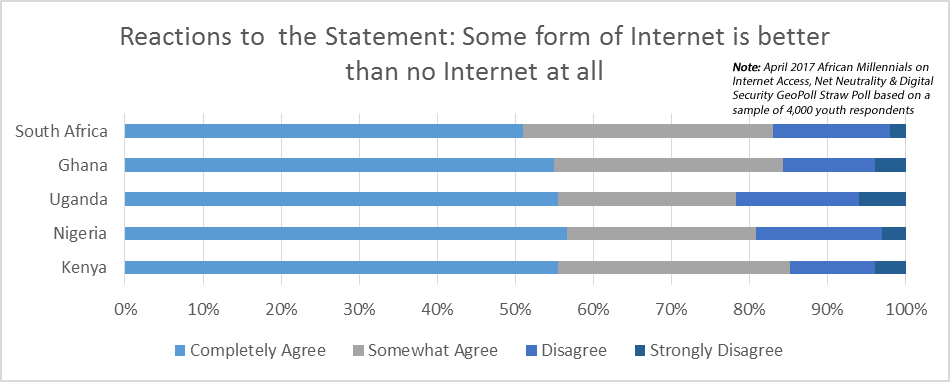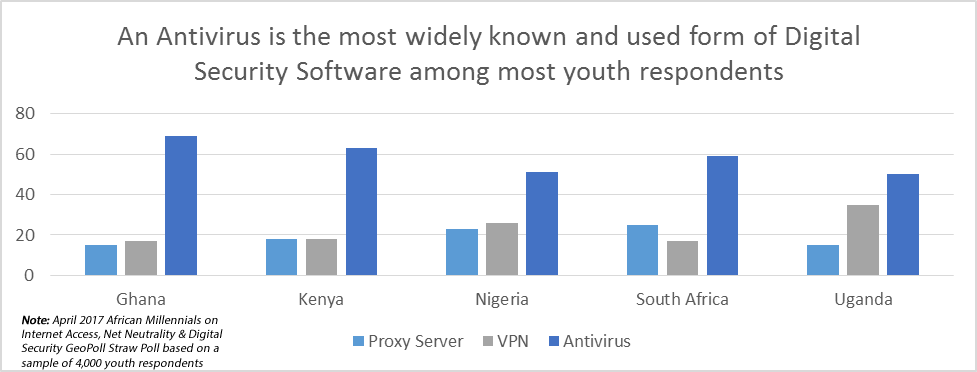- Contents
Internet usage continues to grow, in large part due to increased smartphone penetration in much of Sub-Saharan Africa. GSMA predicts that, in 2020, there will be more than 700 million smartphone connections in Africa. In this segment, we explore insights into internet access, the role of the internet, and digital security among these same youth.
Internet usage continues to grow, in large part due to increased smartphone penetration in much of Sub-Saharan Africa. As at March 2017, Nigeria has the highest number of internet users in Africa at 91.88 million, with 81 percent generated via smart phones. GSMA predicts that, in 2020, there will be more than 700 million smartphone connections in Africa.
In our previous segment in this series, we sought to understand perceptions of free speech as it relates to social media through a straw poll survey among 4,213 youth in Ghana, Kenya, Nigeria, South Africa and Uganda. Read the report here.
In this segment, we explore insights into internet access, the role of the internet, and digital security among these same youth.
Data Costs & Affordability
Data costs continue to be a barrier to internet access for most Africans. Among countries surveyed, a majority of respondents in South Africa find the price of internet to be expensive (58%). A majority of Ghanaians (54%) also find their data costs high. More than half (52%) of respondents indicate that the cost of data in their county was affordable. However, 40 percent find the cost of internet data to be expensive.
South Africa has the lowest cost internet among the surveyed countries. Despite the lowest data cost compared to the other countries in the poll most South Africans feel that the cost is still quite high.
Youth on Social Media
Mobile data continues to be the most used means by which African millennials access the internet. In February 2017, GeoPoll conducted a rapid poll on mobile usage and media consumption: social network platforms such as Facebook, WhatsApp and Twitter form an integral part of everyday life with over 60 percent using social media as their primary source of information. Television comes a distant second at 25 percent, with newspapers being the least important source (6%).
Among the 4,213 respondents from Ghana, Kenya, Nigeria, South Africa and Uganda, 17 percent (one in five) of respondents indicate they post more than 20 times a week on social media. Ten percent said they posted to social media between 11 and 20 times; 28 percent post 6 to 10 times per week; and 45 percent post less than 5 times per week.
Internet Access & Net Neutrality

There are ongoing projects by Facebook and Google to provide free internet through initiatives such as Free Basics and Loon, respectively. We sought sentiments on access to internet and awareness of these initiatives.
In response to “Do you agree with this statement: ‘some form of internet is better than no internet at all’ 1) I completely agree 2) I somewhat agree 3) I disagree 4) I strongly disagree,” most respondents (55 percent) completely agreed with the statement.
With regard to internet access initiatives, GeoPoll found that the program with the largest awareness is Free Basics with 74 percent, followed by Project Loon by Google (25%). In Nigeria, South Africa, Uganda and Ghana, Free Basics has the highest awareness.
Digital Security

GeoPoll found that 38 percent of respondents have used a digital security software before while 62 percent have not. Most South African respondents indicated using multiple types of digital security software at 42 percent when compared to other countries. Uganda has the highest number of users who have used a Virtual Private Network (VPN) in the past. Antivirus software is the most known and widely used form of Digital security software among youth in the polled countries. There is still low awareness and usage of any other forms of Digital security software.
About GeoPoll Straw Polls
GeoPoll is the world’s largest real-time mobile survey platform, reaching a growing network of more than 320 million users in 31 countries worldwide on a deeply granular level and at unprecedented scale. Through partnerships with telecom providers—and a multimodal platform powered by text, voice and web-based communications—GeoPoll enables organizations to gather quick, accurate and in-depth insights on anything from consumer preferences to access to basic government services.
GeoPoll leverages its platform to engage mobile users through ad hoc “straw polls” that provide insights into real-time sentiments of current events. This GeoPoll rapid survey was conducted in April 2017 among 4,213 youth in Ghana, Kenya, Nigeria, South Africa and Uganda using the GeoPoll mobile application.
Straw Poll Specs
- Countries surveyed: Ghana, Kenya, Nigeria, South Africa, Uganda
- Language: English
- Mode: GeoPoll App
- Questionnaire length: 22 questions
- Median survey completion time: 20 minutes
